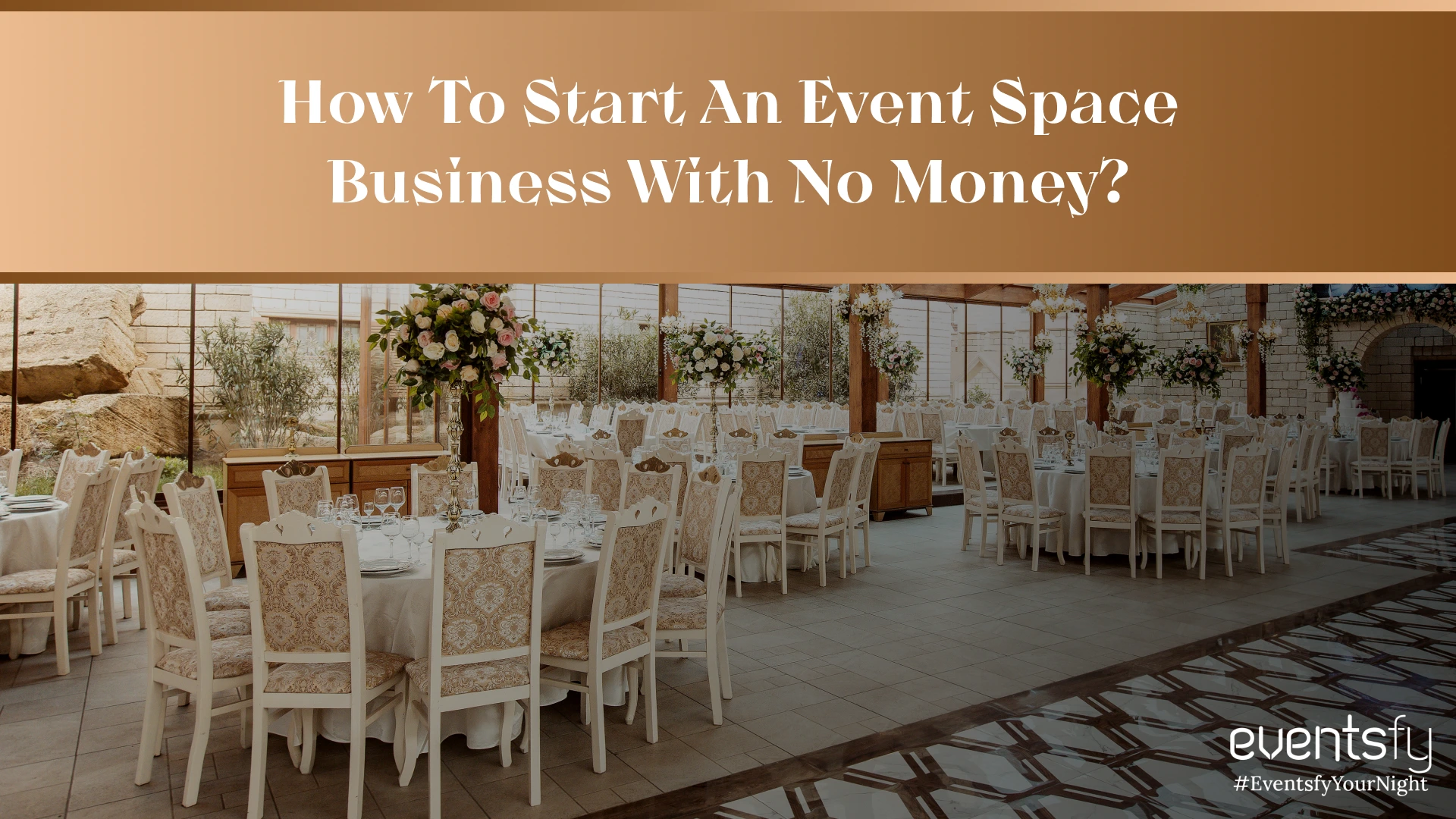By - Gaurav Vermma
Featured Events
Jan 24, 2025
How To Start An Event Space Business With No Money?
Most people would think that starting an event space business sounds like a dream that usually belongs to those who have the resources, but what if you didn’t need a lot of money to do it? Passion, creativity, and resourcefulness can be more important than funding. Read on to see how you can turn your vision into a thriving event space business with little or no capital upfront. From leveraging partnerships to finding low-cost venues, we will help you through all actionable steps for the kick-off of your entrepreneurial journey. Let’s prove that success isn’t about money; it’s about mindset!
Steps To Start An Event Space Business With No Money?
Research and Planning
Thorough research before choosing a venue is the key to a successful event space business. Understand your target market and customer needs. Identify the demand for event spaces, such as weddings, parties, or corporate events. Conduct a competitive analysis of local competition and audience preferences. Knowing these insights will help you craft a clear vision. This will also guide you in choosing the right venue and attracting the right audience.
Develop a Business Plan
Starting an event venue business with no money will require a strategy and resourceful thinking. Identify your revenue streams, which can be rental fees or add-on services. Run a cost analysis to identify the areas where you may incur expenses and cut back on unnecessary spending. Think of creative ways to offset costs, such as teaming up with local vendors or hosting co-hosted events. A business plan is comprehensive and keeps you focused and ready for future challenges.
Define Your Offerings
Determine the kind of services you wish to offer, like weddings, corporate events, or community gatherings. Analyze competitors and identify gaps as well as unique opportunities. Focus on a specific niche and then expand the services. You can diversify your income by renting the venue for concerts, fairs, or expos during off-peak seasons. Offer what your target audience wants at their budgetary levels. Do not offer luxurious services in areas where affordability is a priority.
Taking Care of Business Legalities
Choose the appropriate legal structure according to your business needs and plans. A sole proprietorship is easy to establish and provides full control. However, it also means personal liability for business debts. On the other hand, forming an LLC protects your assets and limits financial risks. Research local regulations, licenses, and permits to ensure compliance with all legal requirements. These steps create a solid foundation for your business operations.
Find a Location
Choosing the right location is critical and often your largest investment. Decide whether to lease, buy, or remodel a venue. Ensure adequate parking, sufficient kitchen space, and the necessary square footage for your target events. Check food safety, fire safety, and local zoning regulations before committing to a space. Offer flexible layouts to attract a variety of event planners and customers. Develop ancillary services such as sanitation, rentals, and vendor support to boost consumer satisfaction. Carefully make cost considerations between the initial investment and operational expenses.
Obtain Permits, Licenses, and Insurance
Legal compliance protects your business and clients. Obtain business licenses, permits, and health and safety clearances. Secure alcohol licenses if you will serve drinks at the events. Schedule regular fire and building code inspections to ensure compliance with safety standards. Invest in necessary business insurance, including general liability and commercial property coverage. If you will hire staff, consider worker’s compensation and unemployment insurance. Consult local authorities or a small business attorney to understand the legal details involved.
Buy Equipment
In addition to a venue, invest in key equipment: furniture, audio-visual systems, and event-specific tools. Begin by creating a comprehensive checklist of all the equipment necessary to hold events without hitches. Determine what can be leased, rented, or purchased to save money. Alternatively, consider using application processes for equipment financing and SBA loans to pay for costly apparatuses. Equip your venue with flexible and adaptable equipment to host a wide range of events.
Also, don’t overlook venue security. Understanding the types of security cameras available can help you choose the right system to monitor entrances, exits, and event activity. From dome cameras to bullet cameras and PTZ options, having visible surveillance adds professionalism and increases safety for your guests and vendors.
Market your business
Market your venue before it opens to attract customers. Offer discounts to your first clients as an incentive. Design interesting posters and put them at strategic locations around your town. Take advantage of local newspapers and social media ads to reach a large audience. Have a professional website and active social media profiles to be more visible online.
Put your venue on Google and optimize it for local search results to attract nearby clients. Reach out to event planners and vendors in your area to promote your venue as a reliable choice. Attend trade shows and conferences to showcase your offerings and network with potential clients. Host an open house with fun activities, snacks, and giveaways to help engage potential customers.
Conclusion
One can create an event space business even without a lot of money, but with a good mental attitude and proper planning, it is achievable. With thorough research, a good business plan, and resourcefulness with offerings and location, you can lay the roots for success. Things like compliance with the law, strategic partnerships, and unique marketing will all drive your business toward success. It’s not about how much money you begin with, but rather how you make the best of your passion, creativity, and resources. Determination and hard work are sure to convert that dream of yours of owning an event space into a thriving reality. Now take that first step and start that journey today!




